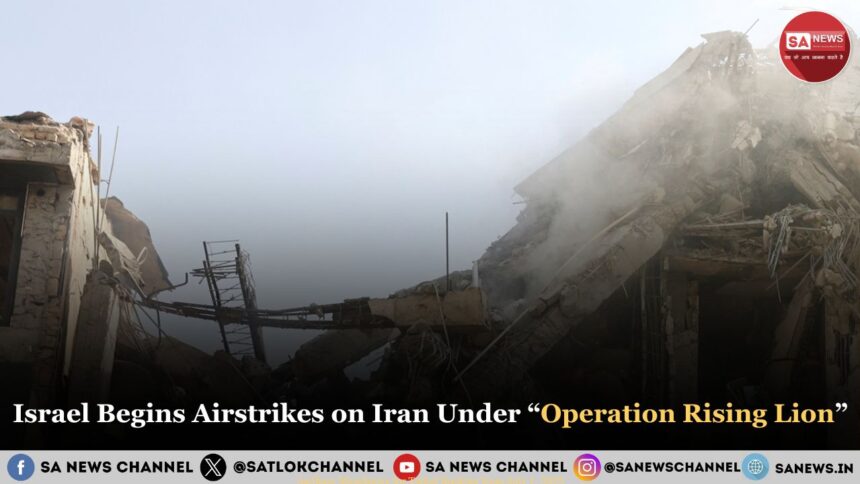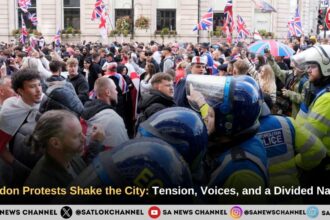June 14, 2025 – Jerusalem / New Delhi / Tehran – On Friday, Israel launched a large-scale air operation called Operation Rising Lion, targeting multiple military and nuclear locations inside Iran. The strikes were meant to damage Iran’s defense systems and nuclear facilities.
- Key Iranian Sites Targeted in Israeli Attack
- Iran Responds With Drone Attack and Strong Warning
- Israel Contacts World Leaders After the Strike
- UN, IAEA, and NATO Urge Restraint
- Markets React: Oil and Gold Prices Go Up
- Outlook: High Risk of Continued Conflict
- Key Issues and What They Mean
- Conclusion: A Dangerous Moment for the Region
Israeli Prime Minister Benjamin Netanyahu said the action was taken to prevent Iran from becoming a serious threat. He claimed that Iran had gathered enough enriched uranium to make several nuclear weapons and had launched missiles toward Israel in the past year. According to him, Israel acted early to avoid a much bigger risk in the future and would continue military actions until that risk is removed.
Key Iranian Sites Targeted in Israeli Attack
Reports from independent sources say that Israeli fighter jets struck several important places in Iran, including:
- Natanz nuclear site, where uranium enrichment takes place
- Missile research areas
- Military command centers
Some sources have also suggested that top Iranian military leaders may have been killed, including Hossein Salami (commander of the IRGC) and Mohammad Bagheri (head of armed forces). However, Iranian officials have not confirmed this.
Iran Responds With Drone Attack and Strong Warning
Soon after the Israeli strikes, Iran launched more than 100 drones toward Israeli targets. Most were shot down by Israeli air defenses. Even so, air raid sirens were heard in cities like Tel Aviv and Jerusalem, and people reported hearing explosions.

Iran also claimed it shot down an Israeli drone near the Fordow nuclear site.
Iran’s Supreme Leader Ayatollah Ali Khamenei called the attack serious and promised a response. He said Iran would not allow such actions to go unanswered and that the country’s military is ready.
Israel Contacts World Leaders After the Strike
After the airstrikes, Netanyahu reached out to global leaders to explain the situation.
India: He spoke with Prime Minister Narendra Modi. Modi showed concern about rising tensions and said efforts should be made to bring peace quickly. India’s foreign ministry also released a statement urging both countries to avoid further action and focus on talks. India said it was ready to help support peace in the region. Israel later said that Modi understood Israel’s need to defend itself.

Germany and France: Netanyahu also had discussions with German Chancellor Olaf Scholz and French President Emmanuel Macron, who were both expected to urge caution.
Other Nations: Calls are expected soon with US President Donald Trump, Russian President Vladimir Putin, and UK Prime Minister Keir Starmer.
UN, IAEA, and NATO Urge Restraint
The United Nations Secretary-General Antonio Guterres asked both sides to stop further attacks and avoid making the situation worse. He said the world is especially concerned about strikes near nuclear facilities, as they pose serious risks.
Also Read: 120 Killed in Israeli Airstrikes Over Gaza; Cancer Hospital Shut Down
Rafael Grossi, head of the International Atomic Energy Agency (IAEA), repeated that nuclear sites should never be hit during military conflicts. He warned that such actions could have long-term and dangerous effects.
In response to Iran’s request, and with support from Russia and China, the UN Security Council held an emergency meeting to discuss the situation. At the same time, NATO Secretary-General Mark Rutte encouraged allied countries to help bring down tensions and prevent the conflict from spreading.
Markets React: Oil and Gold Prices Go Up
The economic effects were seen quickly:
- Oil prices went up due to fears that the conflict could disrupt supply from the region.
- Gold prices also rose, as investors moved money into safer places due to uncertainty.
- Stock markets showed mixed signals, with defense companies gaining while others dropped due to fears of wider instability.
Outlook: High Risk of Continued Conflict
Despite international calls for peace, both Israel and Iran have made it clear they are not stepping back. Israel says it will keep acting until Iran’s nuclear and missile programs are no longer a threat. Iran says it will respond and protect its sovereignty.
The next few days will be important in deciding whether:
- Diplomacy can bring calm
- Military actions continue or grow bigger
- New countries get pulled into the situation
- Civilian areas are affected
Key Issues and What They Mean
- Effect on Oil and Global Energy Supply
This conflict could affect global energy supply, especially if oil from Iran or nearby regions gets blocked or reduced. That would make prices go up around the world and affect countries that depend on imports.
- Role of International Organizations
Organizations like the UN, IAEA, and NATO are trying to calm the situation, but it remains unclear if they have enough influence to stop two countries deeply at odds from going further.
- Modern Warfare Methods
The battle may not stay limited to airstrikes. Countries now also use:
- Cyberattacks to damage systems like electricity, banking, or defense
- Online misinformation to shape public opinion
- Jamming and electronic disruptions to confuse military tools
- These indirect methods can still cause real damage and confusion.
4. New Political Groups and Alliances
This event might push countries to change their political and military ties. For example:
- Some Arab nations may quietly support Israel if they also see Iran as a threat.
- Iran may work more closely with Russia and China.
- Neutral countries like India may try to act as peacekeepers, keeping good ties with both sides.
5. Impact on Civilians
The longer the conflict lasts, the higher the risk to ordinary people:
- Civilians might be hurt or killed if cities are attacked.
- People may flee from dangerous areas, creating a refugee crisis.
- Help from aid groups may slow down or stop if it becomes too risky to deliver supplies.
Conclusion: A Dangerous Moment for the Region
Israel’s launch of Operation Rising Lion marks a serious rise in tensions in the Middle East. Iran and Israel both say they will continue if needed. At the same time, world leaders and international groups are pushing for calm and peace.
Whether things settle down or get worse depends on what both countries do next—and how much pressure or help the rest of the world can offer to prevent more violence.









